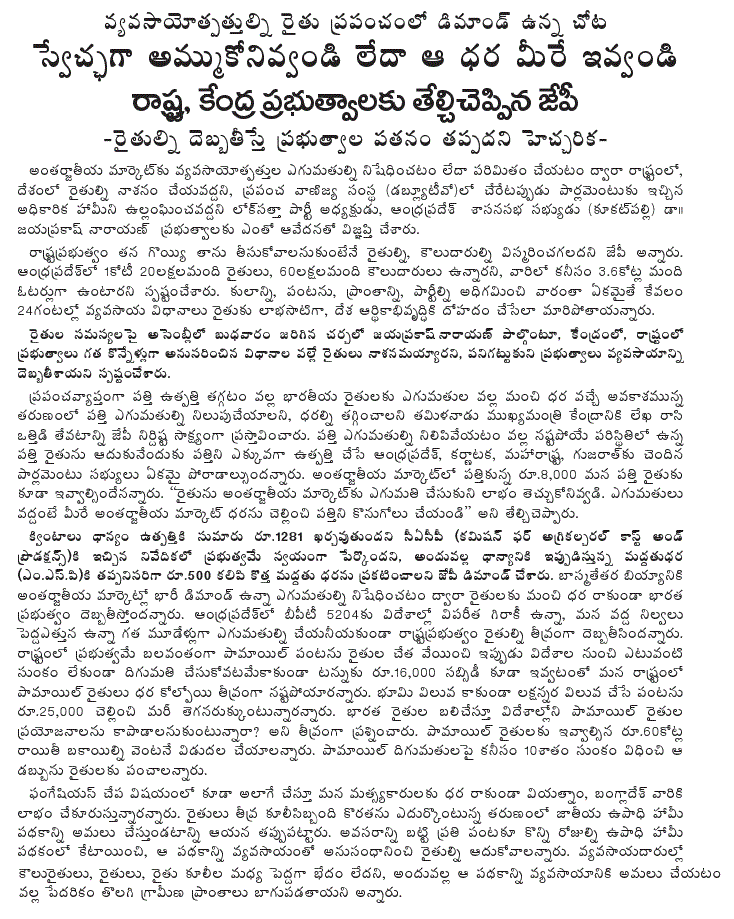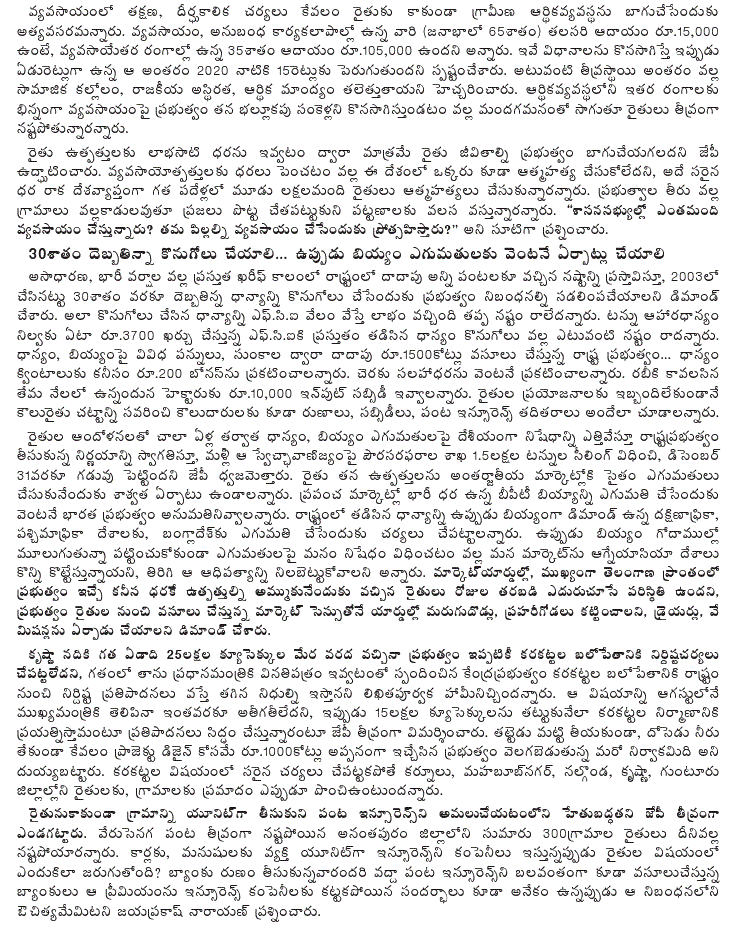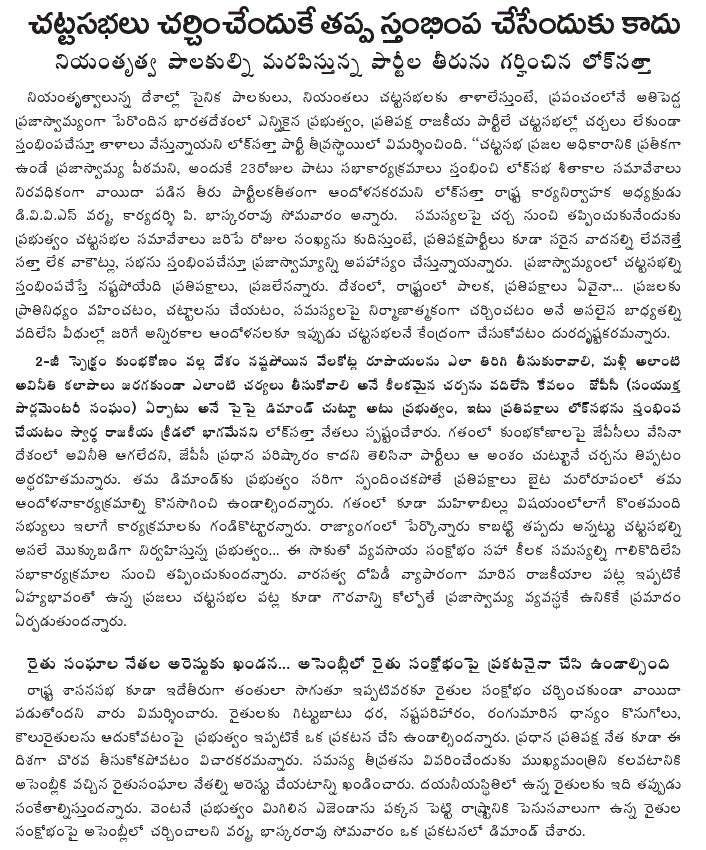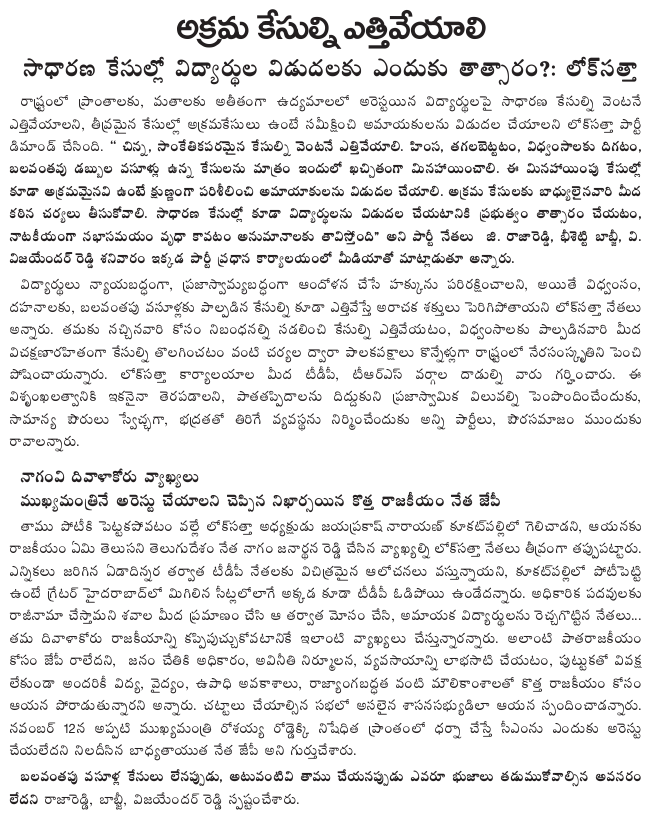Press Releases Archive
Ignore farmers only at your peril, Dr. JP warns State and Center
Dr. Jayaprakash Narayan, Lok Satta Party President and Member of the Andhra Pradesh Legislative Assembly, today made an impassioned appeal to the Government of India not to ruin farmers by banning or limiting exports of agricultural produce in violation of the solemn commitments it had made in Parliament on the eve of joining the World Trade Organization.
Dr. JP wanted the State Government that it could ignore farmers and tenants only at its peril. In Andhra Pradesh, there are 1.2 crore farmers and 60 lakh tenants, comprising at least 3.6 crore voters. If they join hands transcending caste and crop, region and parties, agricultural policies will undergo a metamorphosis in 24, hours.
Taking part in a debate in the Assembly on farmers’ problems, Dr. JP charged that successive Governments at both the Center and in the State have assiduously worked to deny remunerative prices to farmers.
He referred to the pressure being exerted by the Tamil Nadu Chief Minister to ban cotton exports when Indian farmers are likely to get a good price because of a decline in cotton production elsewhere in the world. Should t Members of Parliament belonging to Andhra Pradesh, Karrnataka, Maharashtra and Gujarat, the main cotton producing States, keep quiet when farmers stand to lose because of the curtailment of cotton exports. “Let those crying hoarse against cotton exports ensure payment of prices prevailing abroad to cotton farmers in India.”
The Government of India continues to ban non-basmati rice exports when international rice prices are ruling high and is depriving farmers of getting good prices. It permits duty-free import of palm oil and supplies it a huge subsidy even as farmers who have raised palm plantations are cutting down trees by spending Rs.25,000 an acre as they do not get a remunerative price. Is the Government of India determined to encourage palm crop growers in foreign countries at the cost of farmers in India? Should we permit import fish from Vietnam and Bangaldesh duty-free and harm the indigenous industry? Should the Government take up works under the NREGS at a time farmers are facing acute labor scarcity?
Dr. JP suggested that the Government initiate both short-term and long-term measures not merely to help the farmer but to keep the rural economy vibrant. The per capita income in farming and allied activities is a mere Rs.15000 a year against Rs.105,000 in non-farming activities. By 2020, the disparity between agricultural and non-agricultural incomes is expected to shoot up to 15 times. Such disparities will endanger social cohesion, political stability and economic growth. The agricultural sector, unlike other sectors in the economy, has witnessed a tepid growth because it has not beeen unshackled from Government controls.
The Government can help the farmer improve his lot only by ensuring remunerative prices for his produce. None in the country has committed suicide because of a rise in the prices of agricultural produce whereas nearly three lakh farmers have committed suicide in the last decade, mired as they were in debt because of unviable farming. There is no wonder people are migrating in hordes from rural to urban areas. “How many among legislators would like their children to stick to farming?”
Referring to the damage caused to almost all crops because of unusual and heavy rains during the current kharif season, Dr. JP said that the Government should ensure purchase of paddy by relaxing norms up to 30 percent as it did in 2003. The Andhra Pradesh Government which earned up to Rs. 1500 crore by way of various levies on paddy and rice should pay a bonus of at least Rs.200 a quintal of paddy. It should offer an input subsidy of Rs.10000 a hectare and enable farmers to raise crops in the rabi season. It should enable tenants to avail of loans, subsidies, crop insurance etc by enacting a suitable law, without depriving farmers of their rights.
Dr. JP , while commending the State Government for lifting the ban on free movement of paddy and rice for the first time after many years, faulted the Civil Supplies Department for imposing a quantitative ceiling of 1.5 lakh tons and a deadline of December 31 for such movement. He wanted the Government of India to permit export of BPT rice which commanded a good price in the international market. The rain damaged paddy can be converted into boiled rice and exported to countries in Africa to meet the demand there. It should utilize the agricultural market cess to build toilets and compound walls and install Driers and Weighing Machines in Market Yards, especially in Telangana, where now farmers spend more than a week to sell their produce.
He asked why the Government would not strengthen the Krishna flood banks to withstand an inflow of 25 lakh cusescs when it could advance Rs.1000 crore for designing an unviable project
Dr. JP questioned the rationale of taking the village and not the farmer as a unit for payment of crop insurance. Are not insurance companies taking individuals as a unit for insuring lives, cars, etc. Why should Government make crop insurance compulsory to all bank loan borrowers when it cannot ensure that the banks paid the premia thus collected to the insurance company?
Dr. JP suggested that the National Rural Employment Guarantee Scheme be integrated with agriculture so that workers gain employment even as farmers do not go without workers.
Lok Satta voices concern over derailment of democracy
The Lok Satta Party today expressed concern over the washout of the winter session of the Lok Sabha because of the logjam over constitution of a joint parliamentary committee to probe the 2-G spectrum scandal.
In a media statement, party Working President D. V. V. S. Varma and Secretary P. Bhaskara Rao regretted that instead of focusing their attention on recouping the money the exchequer has lost and preventing such scandals in future, both the ruling and Opposition parties wrangled on JPC, unmindful of the futility of such inquiries in the past.
It was tragic that political parties themselves derailed discussions in the largest democracy of the world. Legislatures have to discuss people’s problems and enact laws. If legislators fail to discharge their duty, people lose.
The Lok Satta condemned the State Government for arresting farmers’ leaders who had come to the Legislature premises to represent their problems to the Chief Minister. The Government ought to have made a statement on ensuring remunerative prices to farmers for their produce, purchase of discolored paddy, input subsidy, and measures to help tenants.
The Lok Satta leaders pointed out that democracy would be in danger if legislatures lost credibility.




